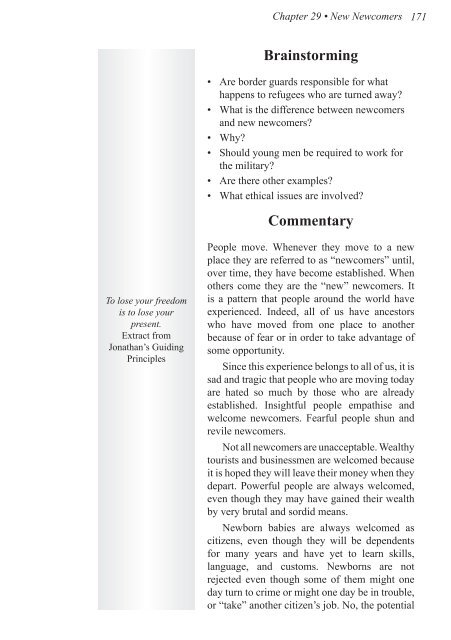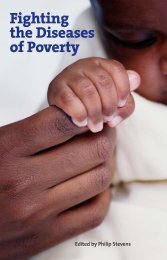The Adventures of Jonathan Gullible - Bastiat Institute
The Adventures of Jonathan Gullible - Bastiat Institute
The Adventures of Jonathan Gullible - Bastiat Institute
You also want an ePaper? Increase the reach of your titles
YUMPU automatically turns print PDFs into web optimized ePapers that Google loves.
To lose your freedom<br />
is to lose your<br />
present.<br />
Extract from<br />
<strong>Jonathan</strong>’s Guiding<br />
Principles<br />
Chapter 29 • New Newcomers<br />
Brainstorming<br />
• Are border guards responsible for what<br />
happens to refugees who are turned away?<br />
• What is the difference between newcomers<br />
and new newcomers?<br />
• Why?<br />
• Should young men be required to work for<br />
the military?<br />
• Are there other examples?<br />
• What ethical issues are involved?<br />
Commentary<br />
People move. Whenever they move to a new<br />
place they are referred to as “newcomers” until,<br />
over time, they have become established. When<br />
others come they are the “new” newcomers. It<br />
is a pattern that people around the world have<br />
experienced. Indeed, all <strong>of</strong> us have ancestors<br />
who have moved from one place to another<br />
because <strong>of</strong> fear or in order to take advantage <strong>of</strong><br />
some opportunity.<br />
Since this experience belongs to all <strong>of</strong> us, it is<br />
sad and tragic that people who are moving today<br />
are hated so much by those who are already<br />
established. Insightful people empathise and<br />
welcome newcomers. Fearful people shun and<br />
revile newcomers.<br />
Not all newcomers are unacceptable. Wealthy<br />
tourists and businessmen are welcomed because<br />
it is hoped they will leave their money when they<br />
depart. Powerful people are always welcomed,<br />
even though they may have gained their wealth<br />
by very brutal and sordid means.<br />
Newborn babies are always welcomed as<br />
citizens, even though they will be dependents<br />
for many years and have yet to learn skills,<br />
language, and customs. Newborns are not<br />
rejected even though some <strong>of</strong> them might one<br />
day turn to crime or might one day be in trouble,<br />
or “take” another citizen’s job. No, the potential<br />
171





![[June 2008, Volume V Quarterly Issue] Pdf File size - The IIPM Think ...](https://img.yumpu.com/31747104/1/190x245/june-2008-volume-v-quarterly-issue-pdf-file-size-the-iipm-think-.jpg?quality=85)
